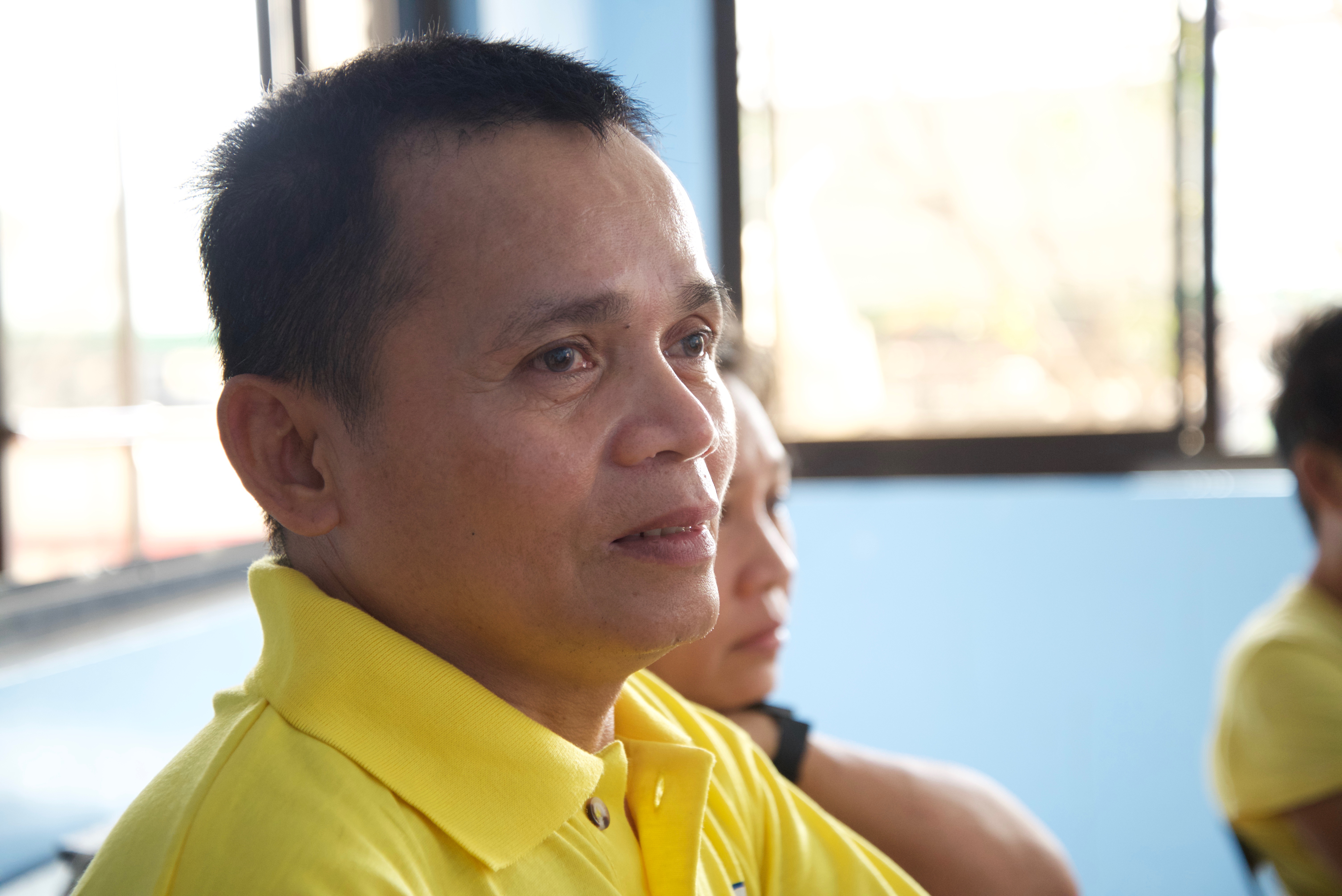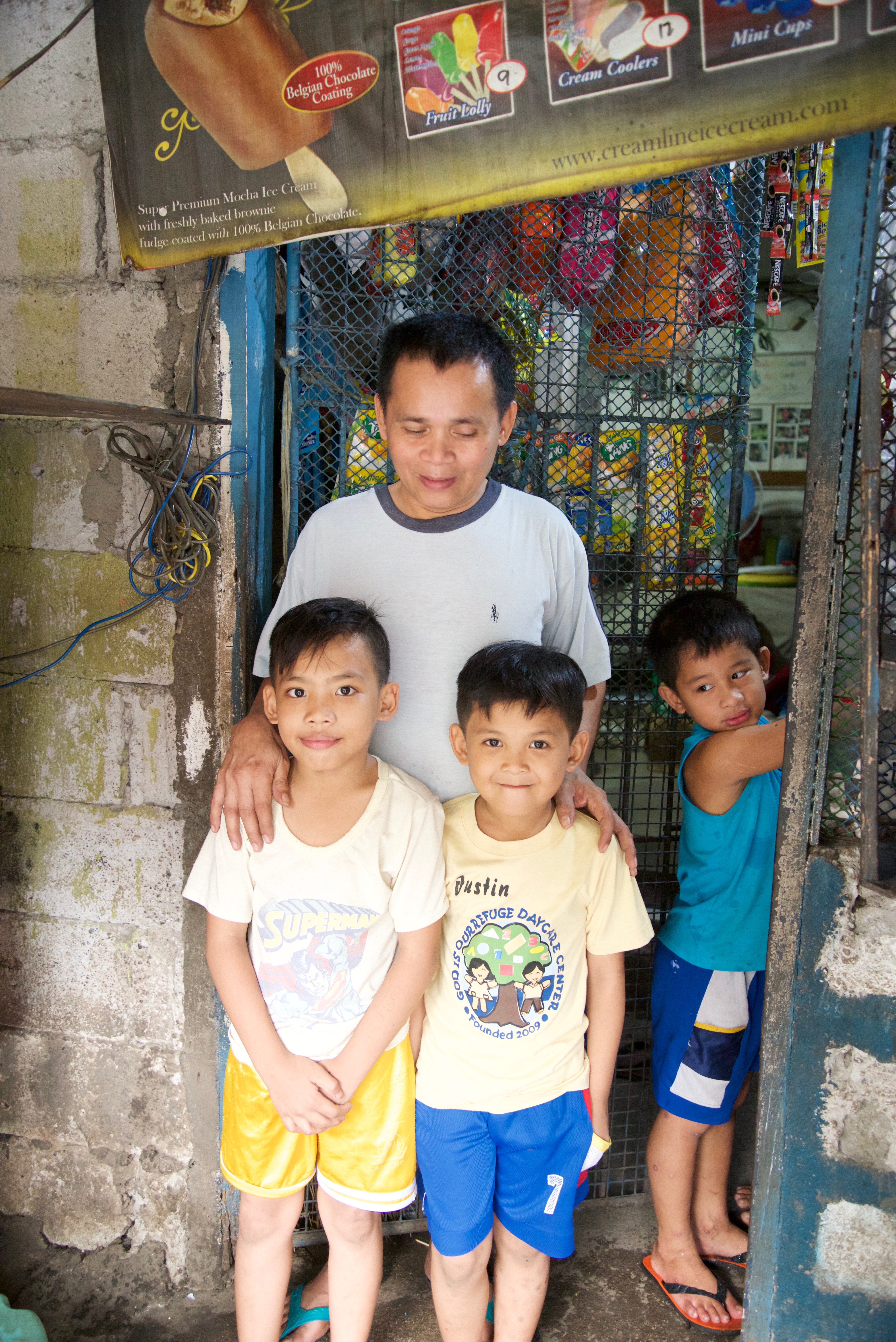In the Philippines, children and adults with even common disabilities, like blindness, face stigma so great that it affects every aspect of their life, including their ability to find jobs, educational opportunities or even safe, adequate housing. Some families, like single father Romy and his two Holt-sponsored children, live in isolation from their broader communities — out of sight and out of mind. But Romy is smart, savvy and motivated to build a better life for his children. Learn how $100 and just a little support from his community has given Romy and his sons greater hope for the future.
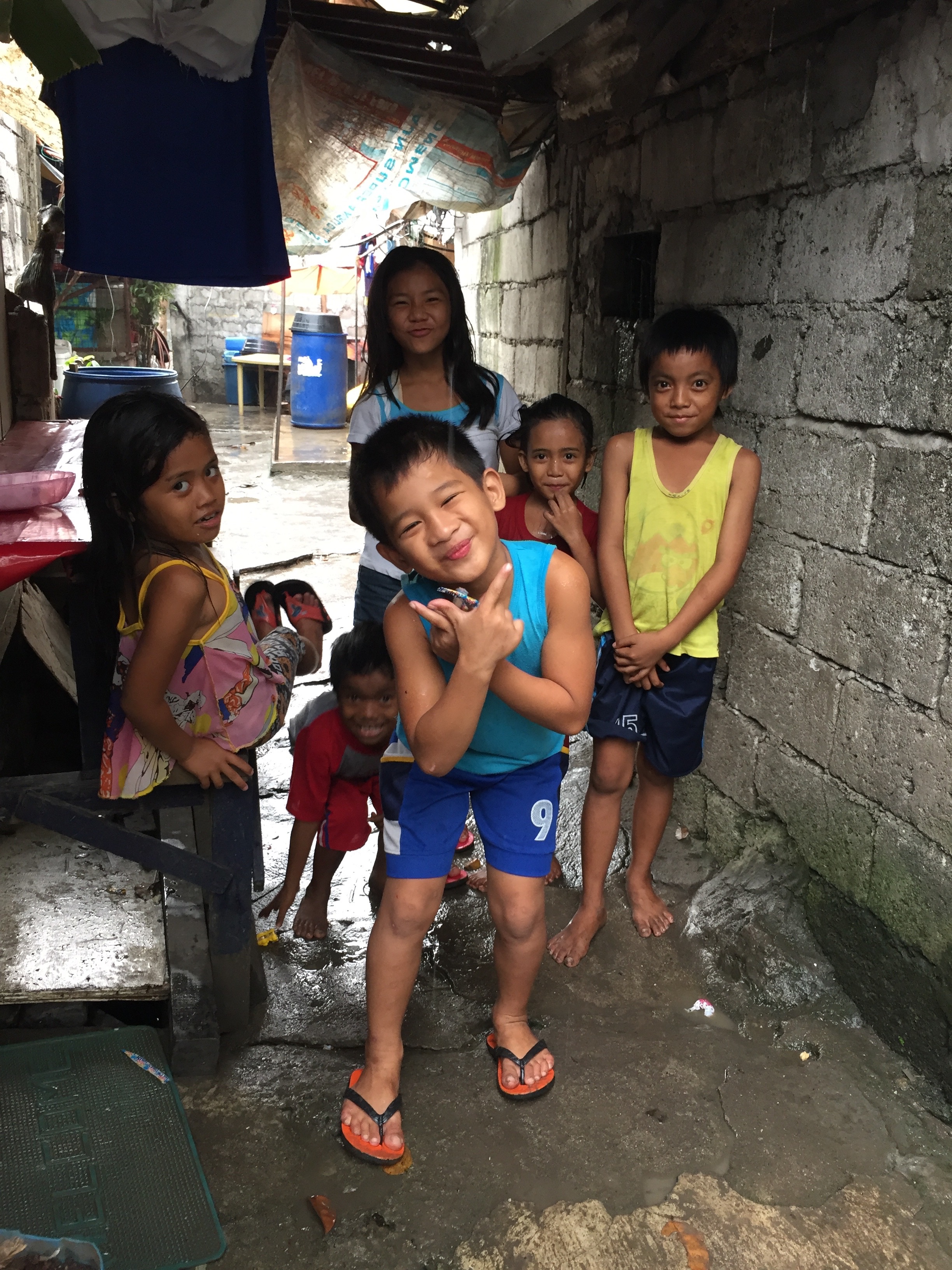
Romy de Luna is a tall, slender man with a kind, soft face. It’s raining hard in Manila today, and Romy huddles under a ripped white tarp that’s draped from the cinderblock doorway of his storefront — a wide set of steal bars painted bright blue and covered by thick grated wire to keep passersby from reaching through. The 10×12-foot space behind these bars serves as both his business, and his home. On one wall a computer — the only computer in Romy’s neighborhood — sits behind a plexiglass case. It’s coin operated, so any user can pay one peso, or about 2 cents, for five minutes of Internet use. Currently, a teenage boy stands at Romy’s computer, scrolling through his Facebook feed.
Romy is one of 51 families from his neighborhood in urban Manila, Philippines enrolled in a Holt-funded program intended to help keep vulnerable children in school and help struggling families learn the skills to increase their incomes. With the help of Holt donors and child sponsorship, Romy’s children receive support to ensure they are successful in school by providing supplies, lunches and other necessities, including a community development advocate who visits with the family regularly. Romy attends monthly meetings with the other families from his neighborhood, and they discuss common hardships, share advice, discuss business success and receive lessons from Holt’s partner staff on such topics as good hygiene practices, financial planning and raising strong, healthy children. Like Romy, all 51 families in the program have school-aged children living in their homes and all run a sari-sari — or “assorted goods” — store. As a part of the program, they can access small, low-interest loans, which they use to expand their product offerings or grow their business. They repay the loans, interest free, in small, weekly payments. Then, they can borrow again.
On average, Romy makes about 250 pesos per day — the equivalent of about $5.30 — selling Internet service and assorted goods such as individually packaged packets of Tang juice powder, Dove body wash, canned foods and other hygiene-care items. Behind a single dividing wall is the small living space that Romy shares with his two sons, Justin, 9, and John Carl, 7. Soon, Romy’s wife will live here, too.
Romy’s face brightens when he shares that he is getting married as soon as they can afford the ceremony.
As the sole provider for his children, Romy has to make his earnings stretch far enough to cover rent, bills, food and basic necessities for his children. Frankly, that’s never easy for him. But it’s a lot easier to make ends meet now than it used to be.
For Romy, Holt’s family strengthening program has given him a voice. He feels empowered to learn the skills to support himself and his children independently. It is giving him hope for the future.
Romy stands out among the group of 51 for two reasons: First, he is one of the only men; secondly, Romy is blind.
“In Manila, there is not much help for people with disabilities,” says Eva Cubacub, director of programs for Holt’s partner in Manila, Kaisahang Buhay Foundation. “They are usually just hidden from view.”
Urban Manila is one of the biggest cities on the planet, with a population of more than 20 million people. Poverty, extreme poverty and gaping income inequality plague entire regions, including growing slum and low-income communities where Holt has programs. Job growth is stagnant, development slow and government safety nets are virtually nonexistent.
In the Philippines, the struggle to escape the clutches of poverty can feel hopeless. But for people with special needs, opportunities are even more limited and stigma is even worse.
As a blind man, Romy feels the impact and isolation of his disability every day.
In Manila, whole regions are divided into barangays, which means district or ward. Large barangays are divided into smaller neighborhoods called escopas. Romy lives in Escopa III of his barangay, which is home to about 7,000 people in the space of about four city blocks. Living conditions within the barangays are humble — most families live in homes made of concrete or cinderblocks and have some running water and perhaps one or two electric lights. It’s not uncommon for families of ten or more to live together in about 250 square feet of space. However, where Romy lives, there are even fewer resources and less development. On the outer edge of Escopa III, a government compound divides the space. The compound is fenced all the way around, and its campus is home to several smaller buildings. On the backside of the compound, there is about one hundred yards of hillside space between the compound and the freeway. This is where Romy lives with about 140 other families — all of whom have at least one person with a disability. Together, they live in isolation. And while the living conditions in the main escopa are humble, they cannot be compared to the area where Romy lives.
In Romy’s neighborhood, sewage flows freely in many places. Many of the paths leading up and down hills to different homes are simply made of dirt and chunks of rock or concrete. Most of the homes are made from scraps of wood and metal, serrated tin and tarps — considerably less durable materials than those used to build homes for most of the rest of Escopa III. Both running water and electricity are more limited, and fewer people walk through the area — creating fewer customers for Romy. At Romy’s house, the tarps leak and it’s hard to keep things clean and dry.
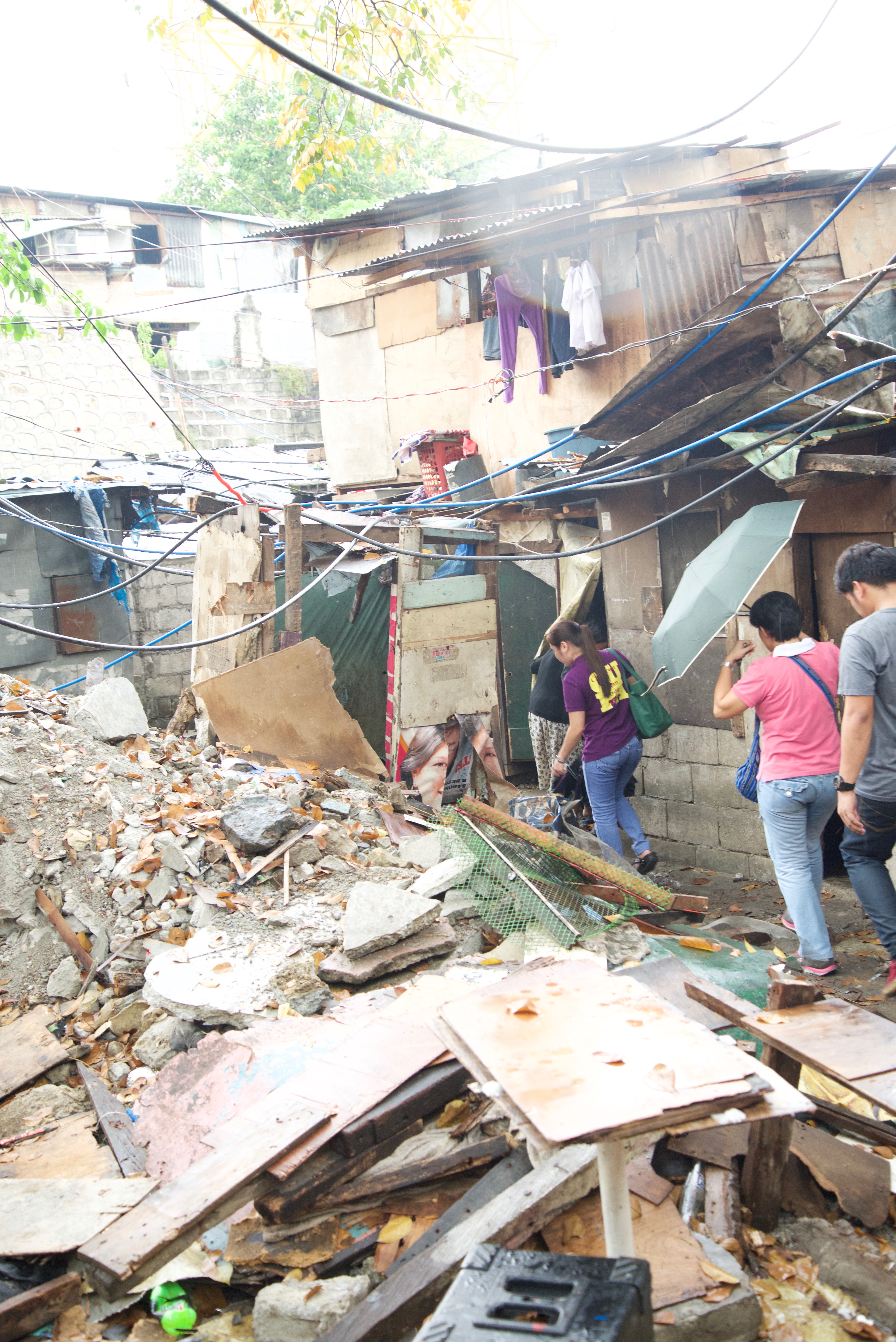
It’s discouraging to live in isolation, as many people with disabilities often do. It’s even more difficult when entire groups of people with various physical or cognitive disabilities are lumped together in the same neighborhood, out of sight and out of mind. There are very few resources, tools or education programs to help people access what they need to be successful. There are no laws about accommodating the needs of children with disabilities in schools or protecting adults with disabilities in the workplace. For that reason, many people in the Philippines with special needs face even greater poverty. This threatens the stability of entire families, since parents of children with special needs often struggle to provide critical medical care for their children — and because children of parents with special needs often carry the same stigma as their parent. And, if their parent can’t find work, they may not have all of the necessities they need.
But Romy has successfully capitalized on every opportunity he’s earned.
When he borrowed the equivalent of about $100 through his Holt-funded self-help group, he used the money to buy sacks of rice and canned goods, which he was able to sell to his neighbors. These products were more expensive than those he offered before he received the loan, so while his business expenses grew, so did his income. Like many families in this program, his income nearly tripled during his first year in the program. And he has been successful in keeping up with his repayments.
Each week, Romy says, he separates his earnings. About 150 pesos for bills and water, 300 pesos for loan repayment, the rest to help meet the needs of his family. Each month, the leftover money seems to grow, giving Romy the opportunity to uplift his family through better nutrition, more educational opportunities for his children, improved hygiene or by investing more in his business. The best part is, it’s up to him.
And that’s the whole point. Marinel Montallana is one of the community development officers who works with Romy and his family. She is employed through Kaisahang Buhay Foundation, Holt’s on-the-ground partner in the region. For her, seeing families grow self-sufficient is the ultimate goal — especially families who work to overcome the stigma and isolation often associated with disabilities in the Philippines.
“The more they earn, the more they can provide for their families’ needs,” Marinel says.
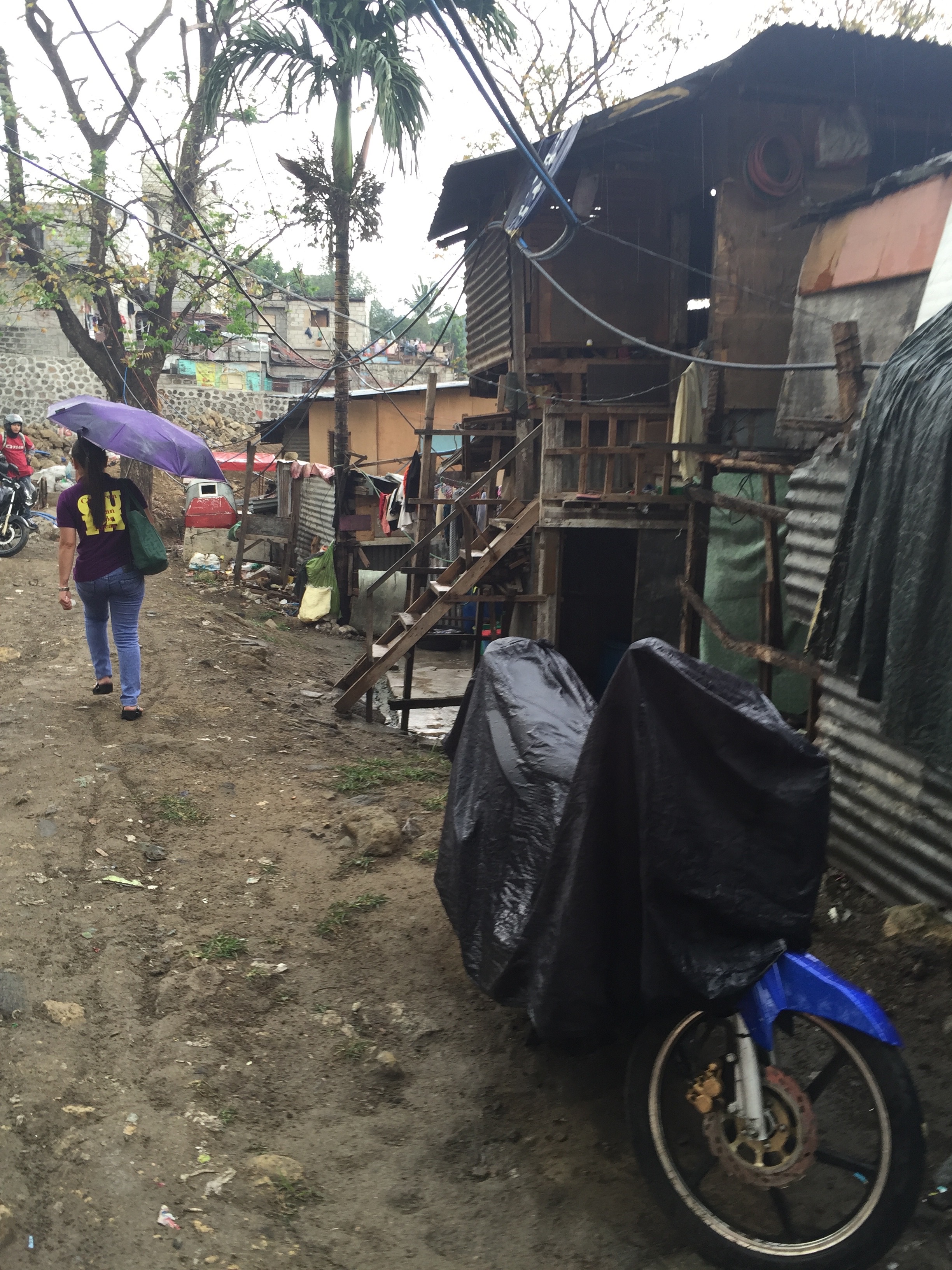
Romy says his sons are doing well in first and third grade, and he is proud of them. His children are a bit shy, but happy and affectionate toward their dad.
“It is a very hard place, where Romy lives,” Marinel says. “He lives in some of the worst poverty. But he’s an example of how just a small investment can make a big difference.”
All of Holt’s family preservation programs aim to holistically and sustainably equip children and families with the skills and resources they need to build independence and break the chains of poverty long-term. This is also true for families and children impacted by the often-debilitating stigma of special needs.
Through the Molly Holt Fund for Children with Special Needs, donations are used to provide tools, resources, medical care, specialized therapies and other vital services for children and families with special needs. These services prevent child abandonment and keep families together. They help to provide quality care for children who have been orphaned or abandoned. And they help Holt ensure that many children can be reunited with their family or join an adoptive family in their country of birth or the United States.
Billie Loewen | Creative Lead

Give to the Molly Holt Fund!
Provide urgently needed medical care to a child in an orphanage with special needs.
